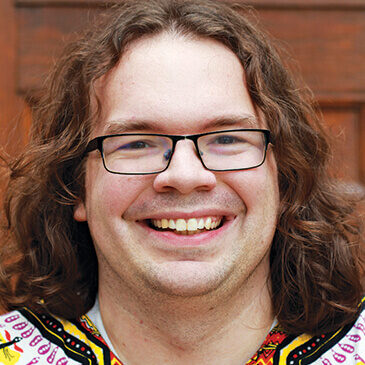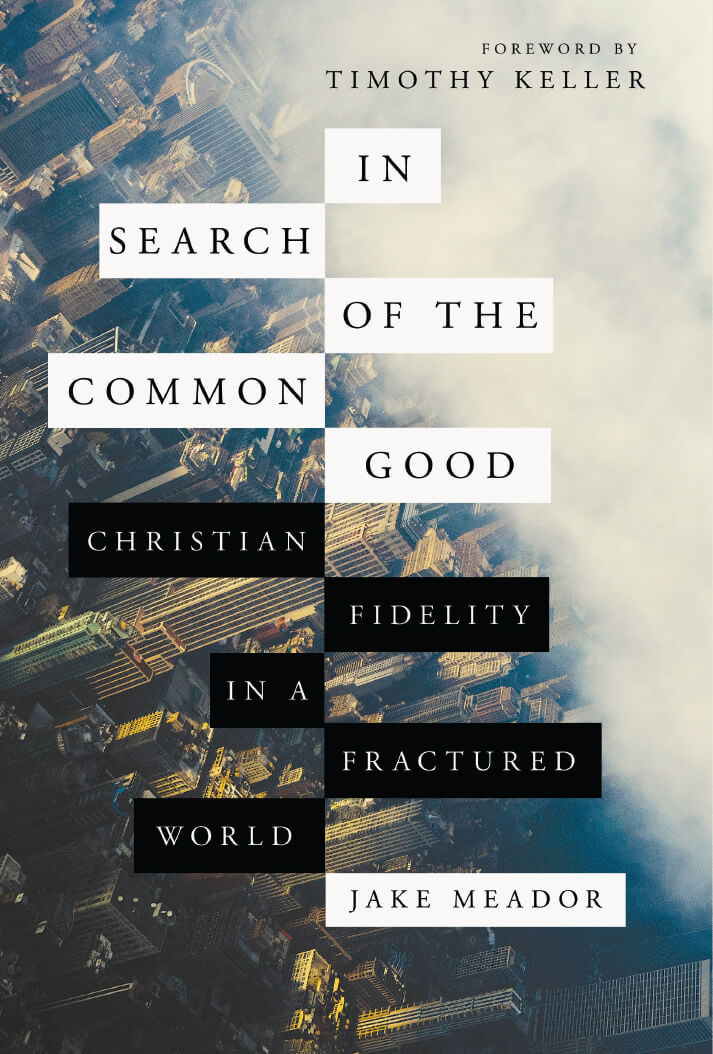About the Book
Common life in our society is in decline.
Our communities are disintegrating, as the loss of meaningful work and the breakdown of the family leave us anxious and alone—indeed, half of all Americans report daily feelings of loneliness. Our public discourse is polarized and hateful. Ethnic minorities face systemic injustices and the ever-present fear of violence and deportation. Economic inequalities are widening.
In this book, Jake Meador diagnoses our society’s decline as the failure of a particular story we’ve told about ourselves: the story of modern liberalism. He shows us how that story has led to our collective loss of meaning, wonder, and good work, and then recovers each of these by grounding them in a different story—a story rooted in the deep tradition of the Christian faith.
Our story doesn’t have to end in loneliness and despair. There are reasons for hope—reasons grounded in a different, better story. In Search of the Common Good reclaims a vision of common life for our fractured times: a vision that doesn’t depend on the destinies of our economies or our political institutions, but on our citizenship in a heavenly city. Only through that vision—and that citizenship—can we truly work together for the common good.
Editorial Reviews
There are voices today that seem either to rub our noses in the church’s failures or to revel in the culture’s fragmentation. While In Search of the Common Good does confront us with the considerable ills of our time, it does so without giving up on either the church or the culture. Instead, it calls us back toward a vision of the ‘good life’—a vision both abandoned by those who have given up on Christian faith and obscured by the harrowed activism of others striving to do influential things in prominent ways in order to demonstrate Christianity’s continued cultural viability. Indebted to his own deep Nebraskan roots (and to thoughtful others far beyond his local community), Meador has written a clear, compelling, and distinctly Christian volume focused on restoring communal flourishing. Born of the belief that Christianity is good news for a world beset by evil and for a church struggling with compromise, so we are encouraged to make our difference by taking up a humbler set of Christian disciplines and practicing ordinary piety. Should Wendell Berry, Charles Taylor, and Francis Schaeffer ever have met to discuss the need for the church to lead by loving Jesus in daily neighbor-benefitting fashion, and should that conversation ever have been recorded, then I can imagine it looking and sounding rather like Jake Meador’s In Search of the Common Good. A bracing, prayer-inducing yet hope-filled read, I am only glad to have read this volume and pray that it finds a wider audience that will take it to heart.
Mark P. Ryan director of the Francis A. Schaeffer Institute, adjunct professor of religion and culture, Covenant Theological Seminary, St. LouisChristian cultural commentators find themselves caught between the Scylla of despair and the Charybdis of triumphalism. It takes a wise, experienced navigator to sail between the two temptations. Meador’s book somehow manages to pair a trenchant diagnosis of our polarized communities with a hopeful prognosis built on a deep theological conception of the good life. It challenges but does not provoke. It offers hope without presumption. Few will agree with Meador on every practical or theological point, but this is exactly why this book deserves to find a wide readership.
David Henreckson assistant professor of theology, Dordt CollegeLike everything else Jake Meador writes, his call to reflect on our pursuit of the common good is a thought-provoking, worthwhile read. It’s also a timely one, if only because it seems so easy to spot our common ills. A distorted notion of freedom in America has given birth to the slavery of self and all its attendant pathologies: loneliness, existential anomie, and pointless work, which form the inner reality of economic instability and sociopolitical isolation. Unfortunately, a malformed, superficial, and ill-catechized church reflects the world at just this point. What, then, may we hope for our common life? Drawing on the wisdom of Scripture, natural law, and the practices of the Christian tradition, Jake points us to a vision of work, community, and politics attuned to the rhythms of creation, reflective of the eternal city and ultimately rooted in the goodness of God himself. I was challenged by this book and I know I’ll be wrestling with and reflecting on its argument for some time. I suspect I won’t be the only one.
Derek Rishmawy PhD student at Trinity Evangelical Divinity School, columnist at Christianity Today, cohost of Mere Fidelity podcastI’ve long admired the breadth of knowledge on display in Jake Meador’s writing. You’ll see his characteristic combination of deep learning with an earthy touch in this wide-ranging book. You won’t need to agree with every conclusion in order to appreciate how he makes you think and act more deliberately. We need more writers like him to help us live as faithful Christians in a fractured world.
Collin Hansen editorial director for The Gospel Coalition, coauthor of A God-Sized VisionJake’s book accurately diagnoses some of the ills of our modern world and, even more importantly, provides a vivid, specific vision of a full and flourishing Christian life.
Leah Libresco author of Building the Benedict Option and Arriving at AmenJake Meador is one of the most insightful evangelical writers of his generation. Without downplaying the severity of the crises that are currently crippling both our churches and our country, he nevertheless sketches what a quietly hopeful Christian witness in our troubled times might look like. By turns diagnostic, instructive, expository, and artful and with a disarming lack of cynicism throughout, this moving book channels Wendell Berry in arguing for the renewable dignity of disappearing virtues.
Wesley Hill associate professor of biblical studies, Trinity School for Ministry, Ambridge, PennsylvaniaWhat if the malaise that grips American communities is the fruit of a church that has failed to bear faithful witness to her King? Jake Meador’s convicting yet hope-giving book calls the church to take up the practice of distinctively Christian forms of membership in order to serve the common good. Meador reminds us that when Christians pursue hidden fidelity rather than public praise, sacrificial service rather than personal peace and affluence, and patient catechesis rather than flashy policy proposals, it is then that they will bless their neighbors.
Jeffrey Bilbro author of Virtues of Renewal: Wendell Berry's Sustainable Forms, editor in chief at Front Porch RepublicIf the bonds of modern society show signs of strain, it is in part because the goods we share as members have ceased to be common or perceived as good. Yet, as Jake Meador reminds us in In Search of the Common Good, the love that unites us around the goods we share in common is reaffirmed through our practices of community and renewed by the promise of community. Meador has provided here an important recovery of the deeply Christian notion of the common good, offering a knowledgeable diagnosis of the common good’s fall into disfavor and an equally knowledgeable proposal for recovering it. Meador reminds us that the common good is worth searching for, and in searching for it we share in it together, eager for all to receive the gifts God has given. Read this book—for you and for your community.
Matthew Arbo assistant professor of theological studies, director of the Center for Faith and Public LifeIn Search of the Common Good is not just a good book, it is a necessary book for our time. Jake diagnoses many of the deep problems in our society and offers a distinctly Christian path forward. I have already begun recommending the book widely, and I suspect that the church in America will be reading and discussing it for a long time to come.
Alan Noble author of Disruptive WitnessIn this beautiful and compelling book, Meador offers readers more than a list of our societal ills. He offers us hope—and a clear and steady path to restoring our homes, churches, and communities. For those already on that path, In Search of the Common Good will breathe new life into their efforts, encouraging them that their lives of quiet faithfulness and goodness are far more significant than they realize. And for those still finding their way, Meador’s words beckon us to the path of life.
Hannah Anderson author of Humble Roots and All That's GoodIn Search of the Common Good offers a vision for life together that is deep, compelling, and wise. This is a profound and important work by an exceptional writer.
Karen Swallow Prior author of On Reading Well and Fierce ConvictionsIn Search of the Common Good is for Christians with hungry souls—Christians seeking more than our stressed and fractured culture can provide. Meador’s work pushes us beyond the realm of political vitriol and atomistic individualism toward real flourishing. He prompts us to consider the world beyond our heads, the entire fabric of creation and community that we have so long neglected—and thus proffers an essential vision for Christians living in our society. This book is ecumenical and inspiring, but most of all, it is right.
Gracy Olmstead The American ConservativeJake Meador has written a learned cri de coeur that situates the division and confusion American Christians face, not in politics, but in our theological imaginations. Carefully analyzing the sources of anger and despair in American life through the lens of the ideas about the common good advanced by Christian luminaries from the church fathers to the Reformers, Meador shows how a renewed understanding of the common good leads out of despair toward hope.
Jonathan D. Askonas assistant professor of politics at the Catholic University of America, fellow at the Center for the Study of Statesmanship

